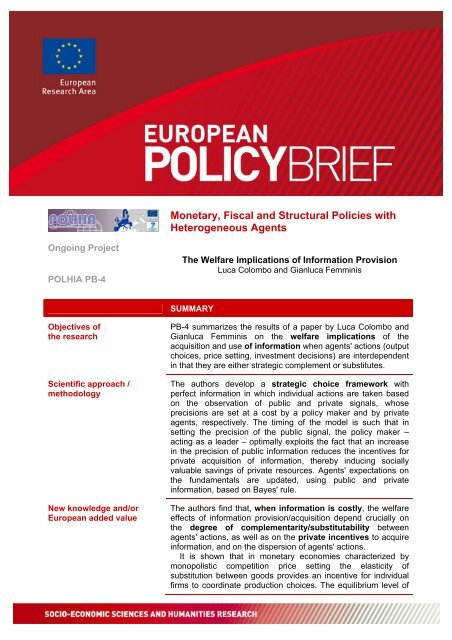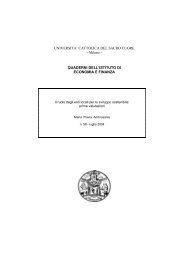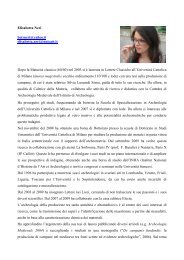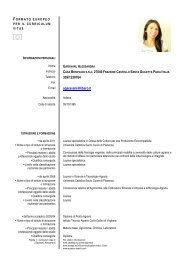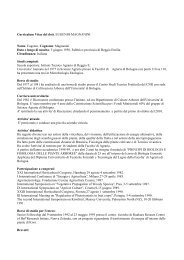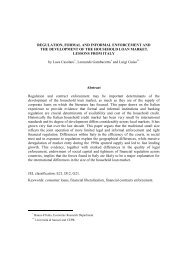Monetary, Fiscal and Structural Policies with Heterogeneous Agents
Monetary, Fiscal and Structural Policies with Heterogeneous Agents
Monetary, Fiscal and Structural Policies with Heterogeneous Agents
You also want an ePaper? Increase the reach of your titles
YUMPU automatically turns print PDFs into web optimized ePapers that Google loves.
Ongoing Project<br />
POLHIA PB-4<br />
Objectives of<br />
the research<br />
Scientific approach /<br />
methodology<br />
New knowledge <strong>and</strong>/or<br />
European added value<br />
<strong>Monetary</strong>, <strong>Fiscal</strong> <strong>and</strong> <strong>Structural</strong> <strong>Policies</strong> <strong>with</strong><br />
<strong>Heterogeneous</strong> <strong>Agents</strong><br />
The Welfare Implications of Information Provision<br />
Luca Colombo <strong>and</strong> Gianluca Femminis<br />
SUMMARY<br />
PB-4 summarizes the results of a paper by Luca Colombo <strong>and</strong><br />
Gianluca Femminis on the welfare implications of the<br />
acquisition <strong>and</strong> use of information when agents' actions (output<br />
choices, price setting, investment decisions) are interdependent<br />
in that they are either strategic complement or substitutes.<br />
The authors develop a strategic choice framework <strong>with</strong><br />
perfect information in which individual actions are taken based<br />
on the observation of public <strong>and</strong> private signals, whose<br />
precisions are set at a cost by a policy maker <strong>and</strong> by private<br />
agents, respectively. The timing of the model is such that in<br />
setting the precision of the public signal, the policy maker –<br />
acting as a leader – optimally exploits the fact that an increase<br />
in the precision of public information reduces the incentives for<br />
private acquisition of information, thereby inducing socially<br />
valuable savings of private resources. <strong>Agents</strong>' expectations on<br />
the fundamentals are updated, using public <strong>and</strong> private<br />
information, based on Bayes' rule.<br />
The authors find that, when information is costly, the welfare<br />
effects of information provision/acquisition depend crucially on<br />
the degree of complementarity/substitutability between<br />
agents' actions, as well as on the private incentives to acquire<br />
information, <strong>and</strong> on the dispersion of agents' actions.<br />
It is shown that in monetary economies characterized by<br />
monopolistic competition price setting the elasticity of<br />
substitution between goods provides an incentive for individual<br />
firms to coordinate production choices. The equilibrium level of
Key messages for<br />
policy-makers,<br />
businesses,<br />
trade unions <strong>and</strong><br />
civil society actors<br />
coordination remains however inefficiently low as firms fail to<br />
fully internalize the negative effects of prices dispersion on the<br />
allocation of resources. In this respect, the acquisition of<br />
idiosyncratic information, by increasing price dispersion,<br />
further reduces the coordination of production resulting in lower<br />
welfare. It is shown that taxing the acquisition of more precise<br />
private information by firms it is a viable tool to improve over the<br />
equilibrium allocations.<br />
If the acquisition of precise private information by private agents<br />
may have ambiguous welfare effects when strategic<br />
complementarities matter, the authors show that the provision of<br />
more precise public information has generically welfare<br />
improving effects. This result builds a clear pro-transparency<br />
case for policy makers – especially central banks – that should<br />
provide reliable <strong>and</strong> precise indicators on the key<br />
macroeconomic <strong>and</strong> monetary variables. Furthermore, when<br />
agents' actions coordination matters, public information tends to<br />
crowd-out private information, reducing agents' incentives to<br />
collect individual signals. This reduces the likelihood that<br />
business cycles are driven by information dispersion, hence also<br />
reducing the importance of information management policies<br />
(versus active monetary <strong>and</strong> fiscal policies) in smoothing the<br />
cycle.
Objectives of<br />
the research<br />
Scientific approach /<br />
methodology<br />
PROJECT IDENTITY 3<br />
Coordination issues play a key role in many economic<br />
environments, ranging from price setting in imperfectly<br />
competitive market, to investment in presence of network<br />
externalities, to output setting in the presence of negative<br />
externalities such as, e.g., pollution. Whenever strategic<br />
interactions matter, agents' actions depend not only on their<br />
own expectations about the fundamental state of the economy,<br />
but also on their expectations about other agents' beliefs. As<br />
available information differs across agents, different beliefs on<br />
other agents' actions emerge.<br />
While the equilibrium characteristics of such environments<br />
have long been understood, their welfare properties have<br />
started attracting interest more recently. A common feature of<br />
the literature investigating these issues is to assume that<br />
information is freely available. In practice, however, the process<br />
of information acquisition/provision is often far from costless,<br />
which ends up constraining the precision of the information<br />
acquired by private agents <strong>and</strong>/or provided by public authorities.<br />
To underst<strong>and</strong> how costly information influences agents'<br />
expectations <strong>and</strong> actions is the goal of the authors' analysis,<br />
who focus in particular on the optimal provision of public<br />
information when coordination among agents' actions matters.<br />
Following Angeletos <strong>and</strong> Pavan (2007), the authors allow for a<br />
rich modelling environment, characterized by the presence of<br />
dispersed information <strong>and</strong> by a variety of possible strategic<br />
effects <strong>and</strong> externalities. As in Angeletos <strong>and</strong> Pavan (2007), in<br />
the authors' framework the effects of public information on<br />
welfare depend crucially on the degree of strategic<br />
complementarity or substitutability of agents' actions. By<br />
restricting attention to economies <strong>with</strong> a unique equilibrium <strong>and</strong><br />
focusing on symmetric linear equilibria, the authors model<br />
explicitly both the acquisition of private information <strong>and</strong> the<br />
provision of public information as being costly <strong>and</strong><br />
endogenously determined. Moreover, decision making is<br />
modelled in a sequential way: private agents are assumed to<br />
choose the precision of their private information only after<br />
having observed the precision of the public signal provided by a<br />
policy maker. The latter acts therefore as a “Stackelberg leader”,<br />
who optimally exploits the fact that an increase in the precision<br />
of the public signal reduces agents' incentives to acquire private<br />
information, thereby inducing socially valuable savings of<br />
private resources. The assumed timing seems consistent <strong>with</strong><br />
the process of information provision/acquisition that is observed<br />
in actual markets. The provision of public information is typically<br />
based on a complex <strong>and</strong> systematic process of data collection<br />
<strong>and</strong> processing performed by a bureau for statistics. In turn,<br />
private agents may enjoy a greater flexibility than the statistics<br />
office in acquiring their desired information targets, as they are<br />
not bound to follow st<strong>and</strong>ard procedures in acquiring additional
New knowledge <strong>and</strong><br />
European added value<br />
PROJECT IDENTITY 4<br />
information. It seems therefore natural to assume that private<br />
agents evaluate the precision of the information provided by the<br />
statistics authority in taking their decisions on the acquisition of<br />
private information.<br />
The authors show that the endogenous choice of the<br />
precision of private signals decreases in the degree of strategic<br />
complementarity among agents' actions. The higher is the<br />
strategic complementarity, the larger are agents' incentives to<br />
align actions, <strong>and</strong> thus the lower is the weight assigned to the<br />
precision of idiosyncratic information. It is also shown that the<br />
precision of private information is decreasing in its cost, due<br />
to the substitutability between private <strong>and</strong> public information.<br />
Furthermore, as expected, private information precision is<br />
decreasing in the precision of public information <strong>and</strong><br />
increasing in the impact of precision on marginal utility; two<br />
results that stem from entirely obvious cost <strong>and</strong> utility effects,<br />
respectively.<br />
The optimal precision of the public signal is determined<br />
essentially by the relationship between the costs of public <strong>and</strong><br />
private information. In particular, it is shown that the policy<br />
maker has no incentives to provide any public information<br />
whenever the cost of public information is sufficiently larger than<br />
that of private information. Furthermore, as is to be expected,<br />
the precision of the public signal – when provided – is<br />
decreasing in its marginal cost, as well as in the precision of the<br />
fundamental. More interestingly, the value of the cost<br />
threshold determining whether public information of positive<br />
precision is provided depends crucially on the socially optimal<br />
<strong>and</strong> on the equilibrium degrees of coordination among agents'<br />
actions. The equilibrium degree of agents' actions coordination<br />
has two countervailing effects on information precision. On the<br />
one h<strong>and</strong>, an increase of the equilibrium degree of coordination<br />
reduces the value that each individual attaches to the precision<br />
of her private signal, which (by augmenting the relative value of<br />
public information) increases the cost threshold. On the other<br />
h<strong>and</strong>, a positive equilibrium degree of agents' actions<br />
coordination implies that individuals tend to overweight public<br />
information (as stressed by Morris <strong>and</strong> Shin, 2002). Accordingly,<br />
an increase in the equilibrium degree of coordination has a<br />
detrimental effect on welfare. The authors show that the first<br />
effect dominates even when the cost of public information<br />
precision exceeds that of private information.<br />
A particularly interesting application of the general<br />
framework discussed above concentrates on the welfare<br />
implications of information provision/acquisition in a<br />
monopolistic competition monetary economy, under the<br />
assumption that information precision has a convex cost.<br />
By embedding the main features of models by Hellwig (2005),
PROJECT IDENTITY 5<br />
Roca (2006), <strong>and</strong> Baeriswyl <strong>and</strong> Corn<strong>and</strong> (2007) into the<br />
general information precision choice model discussed above,<br />
the authors find that the substitution elasticity between goods<br />
induces a “taste” for coordination among agents. As a matter of<br />
fact, the dispersion of prices induces scattering in the production<br />
levels of individual goods; a phenomenon that reduces the<br />
marginal utility of aggregate consumption. The optimal degree<br />
of production coordination is larger than the privately<br />
perceived one because individual price setters do not consider<br />
that the dispersion of prices has a negative impact on the<br />
allocation of resources. Accordingly, the optimal level of public<br />
information precision is always positive <strong>and</strong> larger than the<br />
socially optimal level of precision of privately acquired<br />
information. This remains true even when it is assumed that<br />
public information is substantially costlier than private<br />
information. In a policy perspective, it is shown that the policy<br />
maker should actively discourage individual agents from<br />
collecting more precise private information. Indeed, the<br />
introduction of a tax on the acquisition of private information<br />
succeed in decreasing individual price dispersion, which is<br />
optimal given the taste for individual actions alignment implied<br />
by the monopolistic competition framework.
Key messages for<br />
policy-makers,<br />
businesses,<br />
trade unions <strong>and</strong><br />
civil society actors<br />
Essential references<br />
PROJECT IDENTITY 6<br />
The application of the authors' general framework to a model of<br />
price setting <strong>with</strong> monopolistic competition highlights the<br />
welfare enhancing role of public information provision.<br />
Since price-setters aim at aligning their actions, the value they<br />
attribute to their private signals is lower than the one they attach<br />
to public information. Accordingly, the dem<strong>and</strong> of private<br />
information reduces the larger is the privately perceived motive<br />
for coordination, which creates a need for public information<br />
provision. As this need is reinforced by the fact that the “socially<br />
optimal” degree of coordination is larger than the privately<br />
perceived one, a public authority – e.g., a Central Bank –<br />
should provide precise statistics of the key macroeconomic<br />
variables. Furthermore, the provision of public information<br />
tends to “crowd out” the acquisition of private information<br />
because private agents obtain better information from a source<br />
they value more. Accordingly, when public information is<br />
optimally provided to firms, they have no incentives to acquire<br />
private information. Hence, it is unlikely that the business cycle<br />
will be driven, or amplified, by the dispersion of information. This<br />
implies that active monetary or fiscal policies, as opposed to<br />
information management, are the key ingredients for smoothing<br />
the business cycle.<br />
Angeletos, G. M., A. Pavan (2007), Efficient Use of<br />
Information <strong>and</strong> Social Value of Information. Econometrica,<br />
vol. 75, pp 1103-1142.<br />
Baeriswyl, R., C. Corn<strong>and</strong> (2007), Can Opacity of a<br />
Credible Central Bank Explain Excessive Inflation?.<br />
Discussion paper 2007-08, University of Munich.<br />
Hellwig, C. (2005), <strong>Heterogeneous</strong> Information <strong>and</strong> the<br />
Welfare Effects of Public Information Disclosures. Mimeo,<br />
UCLA.<br />
Morris S., H. S. Shin (2002), The Social Value of Public<br />
Information. American Economic Review, vol. 92, pp 1521-<br />
1534.<br />
Roca (2006) Transparency <strong>and</strong> <strong>Monetary</strong> Policy <strong>with</strong><br />
Imperfect Common Knowledge. Mimeo, Columbia<br />
University.
PROJECT IDENTITY 7<br />
Coordinator Prof. Domenico Delli Gatti (Catholic University, Milan)<br />
Consortium Catholic University of Milan (Italy); University of Amsterdam (The<br />
Netherl<strong>and</strong>s); Università Politecnica delle Marche (Italy);<br />
Fondation Nationale des Sciences Politiques (France); Catholic<br />
University of Leuven (Belgium); University of Rome “La<br />
Sapienza” (Italy).<br />
Duration November 2008 – October 2011 (36 months)<br />
Funding Scheme EC 7 th Framework Programme under Socio-economic Sciences<br />
<strong>and</strong> Humanities, grant agreement n° 225408<br />
Budget Total EC contribution Euro 1,331,530<br />
Website www.polhia.eu<br />
For more information info.polhia@unicatt.it


